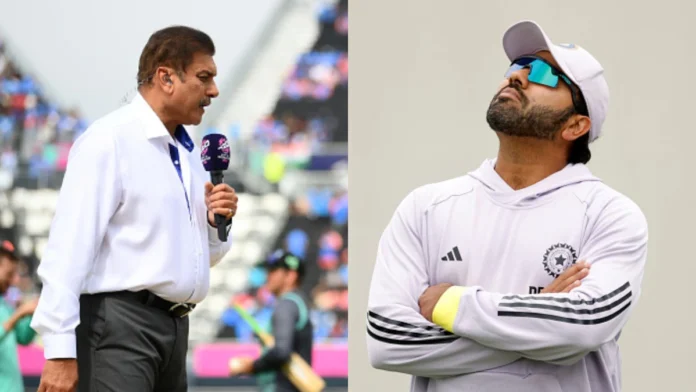Ravi Shastri explains why he refrained from directly questioning Jasprit Bumrah about Rohit Sharma’s absence during the toss for the New Year’s Test against Australia at the Sydney Cricket Ground. With India trailing 1-2 in the Border-Gavaskar Trophy, winning this Test is crucial to retaining the trophy. Rohit’s sudden absence as captain created speculation, which was resolved when Bumrah walked out for the toss on Friday morning.
Bumrah, stepping in as captain, won the toss and chose to bat on a green wicket. During the toss, Shastri, presenting the ceremony throughout the series, did not immediately address Rohit’s absence. Instead, he asked Bumrah about the team combination. Bumrah himself clarified, stating, “Our captain has shown his leadership; he’s opted to rest in this game. That shows there’s a lot of unity in our team, there’s no selfishness. Whatever is in the team’s best interest, we are looking to do that.”
Ravi Shastri Explains Toss Dynamics
Ravi Shastri later explained during commentary why he did not initially bring up Rohit’s absence. He noted that Bumrah preemptively addressed the issue before he could ask. “Before I could even ask him (Jasprit Bumrah), he said the captain opted to sit out and said the team would be stronger if Shubman Gill played. It can happen when you are out of sorts, mentally not there, and you don’t have runs under your belt,” Shastri stated.
Shastri’s response came amid criticism from former Indian cricketer Sanjay Manjrekar, who questioned the lack of transparency in Indian cricket. Speaking on Star Sports, Manjrekar expressed surprise at the absence of direct questioning about Rohit’s decision to step down for the match, describing it as a “cloak and dagger” approach.

Rohit Sharma’s Brave Decision And Shastri’s Perspective
Shastri labeled Rohit’s choice to step aside as a “brave call,” commending the captain for prioritizing the team’s best interests. According to Shastri, Rohit’s decision reflects leadership maturity, especially when the stakes are high in such a crucial Test match.
Speculating on Rohit’s future, Shastri suggested that the opener might “pull the plug” on his Test career soon. “It still is a brave call for a captain to own up and say, ‘I’m prepared to take the bench in this game.’ If there was a home season coming up, he might’ve thought of carrying on, but I think he might just pull the plug at the end of this Test. There are very, very good players in the wings, and it’s time to build,” Shastri said.
Rohit had earlier stepped away from T20 international cricket after India’s World Cup victory but remains undecided about his ODI future.
Rohit Sharma’s Struggles And Recent Form
Rohit’s recent performances have raised questions about his form and engagement. After missing the first Test in Perth for the birth of his second child, he struggled to find consistency, failing to score more than 10 runs in five innings during the series.
These struggles follow a poor showing in India’s 3-0 home series loss to New Zealand in October-November, adding pressure on the experienced batter to reassess his position in the format.

Team Dynamics And The Bigger Picture
Bumrah’s handling of the situation during the toss highlighted the team’s focus on unity and adaptability. By prioritizing the inclusion of Shubman Gill and emphasizing collective goals over individual roles, the Indian side demonstrated its resilience amid challenging circumstances.
As India battles to retain the Border-Gavaskar Trophy, decisions like these underscore the importance of flexibility and team-first thinking in high-pressure scenarios. Shastri’s explanation and Rohit’s bold move reflect the evolving dynamics of Indian cricket, where leadership is about making tough calls for the greater good.

